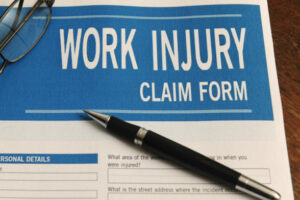Are Lunchtime Accidents Compensable?

When someone is injured at work, they are entitled to receive workers’ compensation benefits as long as their employer carries coverage. However, there are certain ‘gray’ areas during which it may be more difficult to determine whether your injury is covered or not. Being injured while you are on lunch, or on a break, is one of the most common – in theory, you are covered while you are working, but an employer may argue that breaks and meals are not strictly ‘working’ periods. Each case is different, but if you are being denied compensation after an injury on break, contacting an attorney is a good first step.
On Or Off The Premises?
Generally, an injury at work is compensable (that is, you will be entitled to benefits) if you are hurt while acting within the ‘course and scope’ of your employment. This encompasses most acts that one might perform while working, but the major issue is whether or not a break or a lunch period is actually ‘working.’ Historically, Florida courts have held that if the lunch break injury happens on the employer’s premises, it is compensable, because the employee is still within the employer’s control. The employer’s authority over the employee is a major factor in determining whether the employee was acting within the scope of their employment.
That said, not every lunchtime injury that occurs off the premises is immediately non-compensable. If a worker is injured while conducting business during lunchtime, your injury may be compensable because then you would still be acting within the course and scope of your employment. If you take a ‘working lunch,’ and you are injured in an accident, you will usually be able to recover for your injuries, because you are acting in your employer’s interest during your lunch.
“Substantial Deviation”
If you are injured at work, but you are on lunch or on a break, you will generally be able to receive workers’ compensation benefits for your injury. However, if a “substantial deviation” from the course and scope of employment happens during that meal or break period, you may lose out on benefits because at that point, you are no longer under your employer’s control or under their authority. Each case is different – whether a deviation is ‘substantial’ enough must be decided on a case by case basis.
Short, employer-sanctioned breaks are often seen as being a good thing, with regard to one’s employment. In Holly Hill Fruit Products v Krider (1985), Mr. Krider was injured after being hit by a car when he left his employer’s premises to buy cigarettes. His injuries occurred on a break, and he had left the premises, which would imply that he would not be entitled to workers’ compensation benefits. However, the court held that the break was of such an “insubstantial duration” that his employer retained authority over him, and also stated that since the employee was attending to his personal comfort, that the break might actually lead to increased productivity and happiness on the job.
Contact An Orlando Workers’ Compensation Attorney
Being injured at work is an experience that can change your life, and if you are injured on a break, it is important that you have a knowledgeable attorney on your side who can ensure that you receive the benefits you are entitled to receive. The Orlando workers’ compensation attorneys at the Hornsby Law Group are ready to try and assist you with your case. Call our offices today for a free consultation.
Resource:
casemine.com/judgement/us/59148e36add7b04934550453
leg.state.fl.us/statutes/index.cfm?App_mode=Display_Statute&URL=0400-0499/0440/Sections/0440.09.html
https://www.hornsbylawgroup.com/what-happens-when-my-workers-compensation-claim-is-denied/
